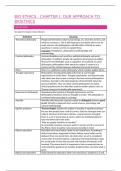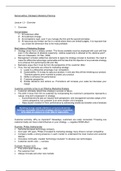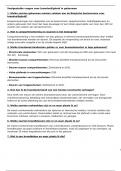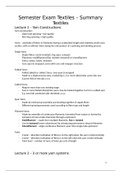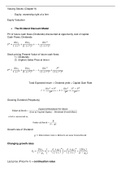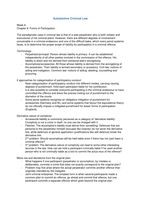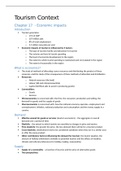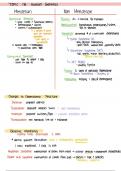BIO ETHICS : CHAPTER I: OUR APPROACH TO
BIOETHICS
DEFINITIONS
See also first chapter of Lies Mensch
Definition Meaning
Theoretical philosophy People ask themselves what human beings are, what the world is, and
what the universe is. This is still important, but mainly taken over by
exact sciences. But philosophers will still reflect critically on many
questions in science and try to explain these.
Examples: metaphysics, philosophical anthropology and
epistemology.
Practical philosophy Involves disciplines such as ethics, political philosophy and social
philosophy. In political, people ask questions about power & politics.
Structures and ideologies such as capitalism are analyzed. In social
philosophy, philosophers think about the origins & essence of a
society and the relation between individual and social structure
Ethics Ethics is a subdivision under philosophy which includes applied ethics.
Thought experiment Philosophers develop philosophical theories & use thought
experiments to clarify them. Thought experiments are fictional cases
with which one tries to test or bring to the fore certain philosophical
intuitions. Example is the teletransporter of Derek Parfit about the
personal identity. They are often used by philosophers to tackle
ethical questions but are also often used by modern physics such as
Thomas Young in his double split experiment.
Experimental philosophy Questioning the function of thought experiments and the
philosophical intuitions they are thought to evoke. This philosophy is
combined with psychology & sociology
Morality Morality talks about the common notion to distinguish between good
& evil. Morality is approach from social sciences, psychology and
cultural anthropology
Egoistic prudence Thomas Hobbes situates the origins of morality in egoistic prudence.
He says that people have a will to survive. Only the strongest ones can
make it. Because of this harsh climate, a social contract emerged:
there is a set of moral rules & norms, which are institutionalized in
laws and enforced by the state.
‘Why are people sensitive to morality?’
So essentially, because everyone wants to survive and it is survival of
the fittest, there should be rules to keep morality in check
Ethical naturalism Describes how moral values relate to non-moral facts. According to
ethical naturalism, supported by Peter Railton, moral valies can be
deduced from non-moral facts. He states that an act is considered
moral when it is performed by a rational & informed individual, takes
the social point of view into account and includes all interests of all
involved. This means that it is important to look at empirical data to
understand the goodness of morality. Empirical facts can show what is
good.
Ethical non-naturalism Good cannot be reduced to other non-moral facts. Goodness is a real
, characteristic and can be shown and grasped. Intuitions are important
(G.E. Moore)
QUESTION 1: WHAT IS MEANT BY AN ‘ETHICO-ONTO-EPISTEMOLOGY’?
- Ethico-onto-epistemology = a philosophical concept that integrates ethics, ontology and
epistemology. These are deeply entangled!
1. Ontology: how the world IS
2. Epistemology: how we KNOW things
3. Ethics: what we SHOULD do
ONTOLOGY
Ontology = the philosophical study of being: it investigates what types of entities exist, how they are
grouped into categories and how they are related. Thinking about how the world is.
Ontology refers to our conceptualization of reality and of the phenomena that are part of reality.
Specific concepts that we take for granted in everyday life, are not straightforward upon closer
consideration.
Thinking about how concepts are used in science, is also essential for communicating science: how
do you define ‘disease’, eg is autism a disease/disorder? Do we want to cure/solve/prevent this?
EPISTEMOLOGY
Epistemology = theory of knowledge, especially with regard to its methods, validity and scope and
the distinction between justified belief and opinion. When is something scientifically proven? What
counts as a scientific fact? How does science progress? what kind of conditions should statements
have, in order to be true?
ETHICS
The central question: ‘how should one live?’. = linked to the basis of
good & evil, moral norms & values, the good life and the organization
of a just society. It is about the study and search for the principles that
are the foundation of norms and values. Ethics becomes synonymous
w/ moral philosophy. It is a branch of philosophy that deals with
morality on multiple levels.
It is an interdisciplinary approach, that tries to understand how ethical principles influence our
understanding of reality & the acquisition of knowledge, and conversely how our understanding of
reality and knowledge shapes our ethical beliefs and behaviors. In essence, ethico-onto-epistemology
examines the ethical dimensions of knowledge and reality, and how they inform each other.
How do we weigh the interests of non-human animals versus humans? this is where it gets
interesting… Because bioethics makes sure that there is no unnecessarily harm of animals, BUT it also
has to think about what it means that animals are not unnecessarily harmed. How do we define what
‘acceptable harm’ entails?
BIOETHICS
DEFINITIONS
See also first chapter of Lies Mensch
Definition Meaning
Theoretical philosophy People ask themselves what human beings are, what the world is, and
what the universe is. This is still important, but mainly taken over by
exact sciences. But philosophers will still reflect critically on many
questions in science and try to explain these.
Examples: metaphysics, philosophical anthropology and
epistemology.
Practical philosophy Involves disciplines such as ethics, political philosophy and social
philosophy. In political, people ask questions about power & politics.
Structures and ideologies such as capitalism are analyzed. In social
philosophy, philosophers think about the origins & essence of a
society and the relation between individual and social structure
Ethics Ethics is a subdivision under philosophy which includes applied ethics.
Thought experiment Philosophers develop philosophical theories & use thought
experiments to clarify them. Thought experiments are fictional cases
with which one tries to test or bring to the fore certain philosophical
intuitions. Example is the teletransporter of Derek Parfit about the
personal identity. They are often used by philosophers to tackle
ethical questions but are also often used by modern physics such as
Thomas Young in his double split experiment.
Experimental philosophy Questioning the function of thought experiments and the
philosophical intuitions they are thought to evoke. This philosophy is
combined with psychology & sociology
Morality Morality talks about the common notion to distinguish between good
& evil. Morality is approach from social sciences, psychology and
cultural anthropology
Egoistic prudence Thomas Hobbes situates the origins of morality in egoistic prudence.
He says that people have a will to survive. Only the strongest ones can
make it. Because of this harsh climate, a social contract emerged:
there is a set of moral rules & norms, which are institutionalized in
laws and enforced by the state.
‘Why are people sensitive to morality?’
So essentially, because everyone wants to survive and it is survival of
the fittest, there should be rules to keep morality in check
Ethical naturalism Describes how moral values relate to non-moral facts. According to
ethical naturalism, supported by Peter Railton, moral valies can be
deduced from non-moral facts. He states that an act is considered
moral when it is performed by a rational & informed individual, takes
the social point of view into account and includes all interests of all
involved. This means that it is important to look at empirical data to
understand the goodness of morality. Empirical facts can show what is
good.
Ethical non-naturalism Good cannot be reduced to other non-moral facts. Goodness is a real
, characteristic and can be shown and grasped. Intuitions are important
(G.E. Moore)
QUESTION 1: WHAT IS MEANT BY AN ‘ETHICO-ONTO-EPISTEMOLOGY’?
- Ethico-onto-epistemology = a philosophical concept that integrates ethics, ontology and
epistemology. These are deeply entangled!
1. Ontology: how the world IS
2. Epistemology: how we KNOW things
3. Ethics: what we SHOULD do
ONTOLOGY
Ontology = the philosophical study of being: it investigates what types of entities exist, how they are
grouped into categories and how they are related. Thinking about how the world is.
Ontology refers to our conceptualization of reality and of the phenomena that are part of reality.
Specific concepts that we take for granted in everyday life, are not straightforward upon closer
consideration.
Thinking about how concepts are used in science, is also essential for communicating science: how
do you define ‘disease’, eg is autism a disease/disorder? Do we want to cure/solve/prevent this?
EPISTEMOLOGY
Epistemology = theory of knowledge, especially with regard to its methods, validity and scope and
the distinction between justified belief and opinion. When is something scientifically proven? What
counts as a scientific fact? How does science progress? what kind of conditions should statements
have, in order to be true?
ETHICS
The central question: ‘how should one live?’. = linked to the basis of
good & evil, moral norms & values, the good life and the organization
of a just society. It is about the study and search for the principles that
are the foundation of norms and values. Ethics becomes synonymous
w/ moral philosophy. It is a branch of philosophy that deals with
morality on multiple levels.
It is an interdisciplinary approach, that tries to understand how ethical principles influence our
understanding of reality & the acquisition of knowledge, and conversely how our understanding of
reality and knowledge shapes our ethical beliefs and behaviors. In essence, ethico-onto-epistemology
examines the ethical dimensions of knowledge and reality, and how they inform each other.
How do we weigh the interests of non-human animals versus humans? this is where it gets
interesting… Because bioethics makes sure that there is no unnecessarily harm of animals, BUT it also
has to think about what it means that animals are not unnecessarily harmed. How do we define what
‘acceptable harm’ entails?

